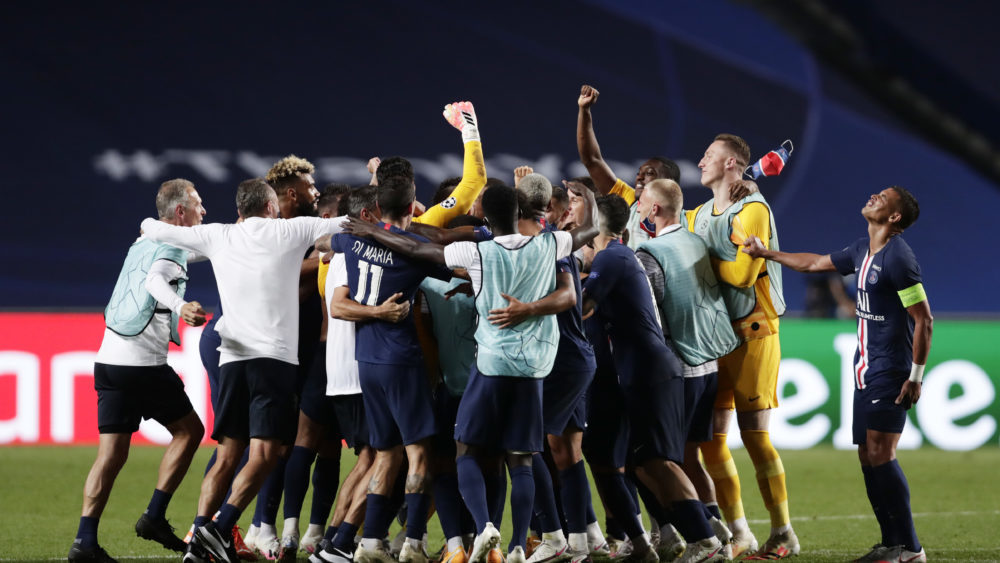Champions League Final Preview: PSG against Bayern
FC Bayern have now been unbeaten in 29 competitive matches. Only RB Leipzig managed to hold them to a goalless draw in this time. The main engineer behind this success is of course Hansi Flick. Although he himself does not like to be the center of attention, he has in an impressively short time built a team that can now repeat the historic treble of 2013. It is part of his likeable personality that he is visibly uncomfortable being in the spotlight at media conferences and that he always shares his praise among the entire team.
In doing so, however, he also demonstrates impressively time and again what makes his Bayern side so strong: the team spirit that he himself exemplifies most. It is just one more win that separates FC Bayern from a Champions League triumph. With Paris Saint-Germain, probably the biggest challenge of the season so far awaits – the end boss, so to speak. But the same applies to Thomas Tuchel and his team. He too can make history in France – at least in men’s football. Because so far in France the treble has only been achieved by the women of Olympique Lyon, and that four times already.
Both Flick and Tuchel leave nothing to chance and will challenge each other on a very high level. Paris also has one of the best attacking tridents in the world with Neymar, Kylian Mbappé and Angel di María. But at the back, they have already afforded a lot of good opportunities for their opponents to score.
Interestingly, exactly the same can be said about FC Bayern. Thomas Müller, Robert Lewandowski and Serge Gnabry are in no way inferior to their Parisian counterparts, with any two of them having joined up in 28 of the 42 Bayern goals in this Champions League season – more than all of PSG put together (25). But Bayern, too, have shown in the past that they are vulnerable at the back.
Tactical analysis: Who has the better press, who the better build-up play?
Finals are rarely decided solely by special tactical feats. The referee’s performance, individual blunders or one excellent moment, the rate of chance conversion, the form on the day, even things like nutrition or the environment during match preparation can play a major role in the end result. However, strategy and tactics will play a not inconsiderable role – especially because both coaches attach great importance to it.
In addition, there is little that can be analysed as readily as the tactical aspects of the game. And so we ask the question how both teams of coaches will set up their teams tactically for the game and what of it will probably have the greatest bearing on the outcome.
Looking for tactical clues, the first thing jumping out is that the strategic goals for both teams are quite similar: Within their system, they try to take their game to the opponent. For both teams this means that they try to put the opponents’ build-up play under pressure. Conversely, it also means that both teams will have to find ways to escape this pressure in their own build-up play.
Analysis 1: Build-up play PSG, Pressing Bayern
The two go hand in hand, of course. That is why we will first have a look at the build-up play of PSG under Thomas Tuchel and hence at the tactical means both teams deploy to implement their strategy. Especially against RB Leipzig PSG showed what a calm and composed team in possession they can be. Time and again, the Parisians managed to keep Leipzig’s defense busy until Neymar, Mbappé and di María were able to find a breakthrough from the space in between the lines.
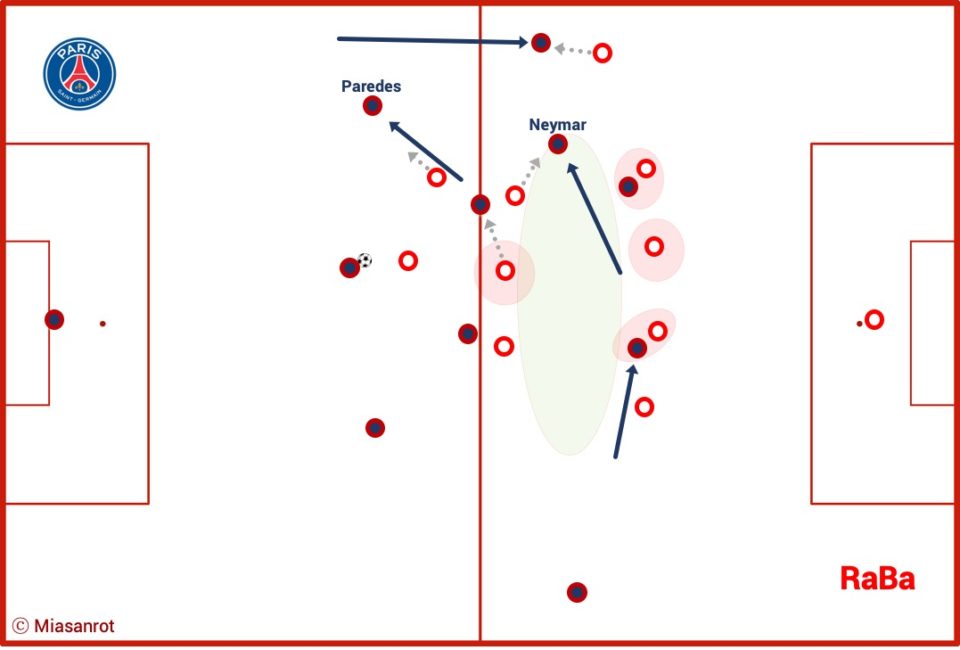
Leipzig on their part failed to recognise and defend the recurring patterns in PSG’s build-up play. As the graphic above shows, PSG likes to work with positional changes. Their inside-left offensive midfielder is usually the more decisive actor in midfield – often Paredes. He is supposed to help beat the press of the opponent by dropping back to the left-back position. The original left-back in turn pushes up to tie up the opposing defender. At the same time, Mbappé and Neymar are looking for ways between the opponent’s lines to offer Paredes a passing option.
Neymar in particular moves a lot with the ball and sometimes even drops back deep into midfield. But Leipzig also let this happen to them. In between their three central midfielders and back three, the Parisians time and again managed to find open spaces where they could receive the ball. Leipzig did not defend compactly enough to be successful with a mid block against such a composed team on the ball.
Will Bayern be able to force PSG to make mistakes?
Bayern will probably present PSG with a different level of challenge. They are more present in the space between the lines and they attack the opposition’s build-up players so high up the field that PSG will have much less time to make decisions.
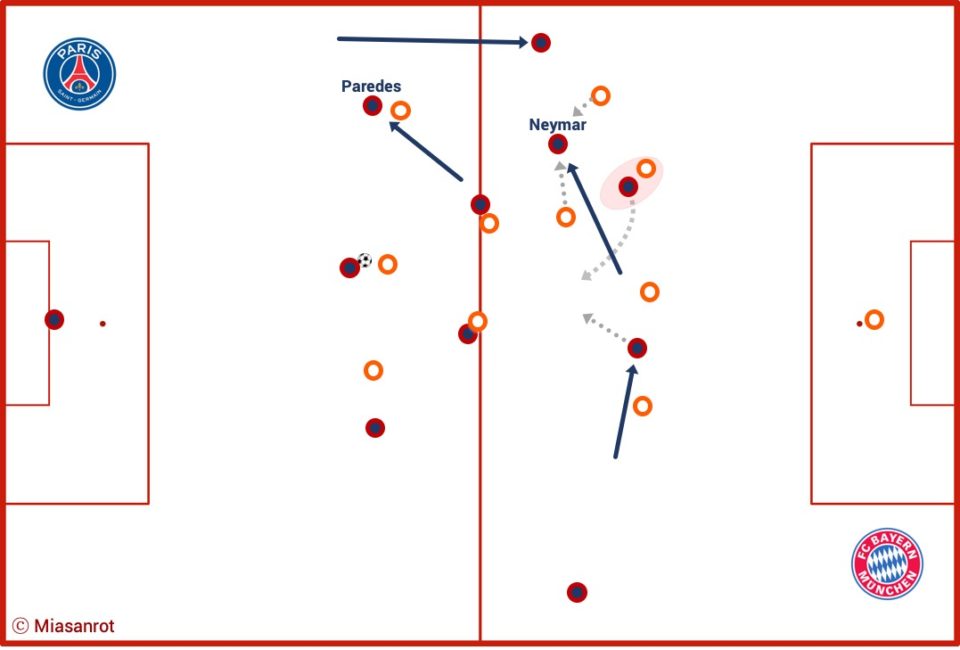
That PSG is not used to such pressure became evident in the first half of their quarter-final against Atalanta. The Italians had a total of 16 ball wins in the opposing half, many of them in good and central positions. As the graphic above indicates, it will be important for Bayern to make the right decisions. The duty of defending Neymar’s, di María’s or Mbappé’s movements will have to be shared by several players. Sometimes it will be the right-back, sometimes the holding midfielder, sometimes the center-back – it will be imperative to squeeze the space between the lines without leaving other areas too exposed.
Tuchel ist aware of Bayern’s weaknesses on the right side of defense. It is thus a fortunate coincidence for him that PSG has their strengths on their left attacking side. If Neymar and Mbappé manage to draw the attention of several players on them in pressing, there will be room for their teammates, particularly di María, who often flies somewhat under the radar in PSG’s attack, but has been a world-class operator there for years.
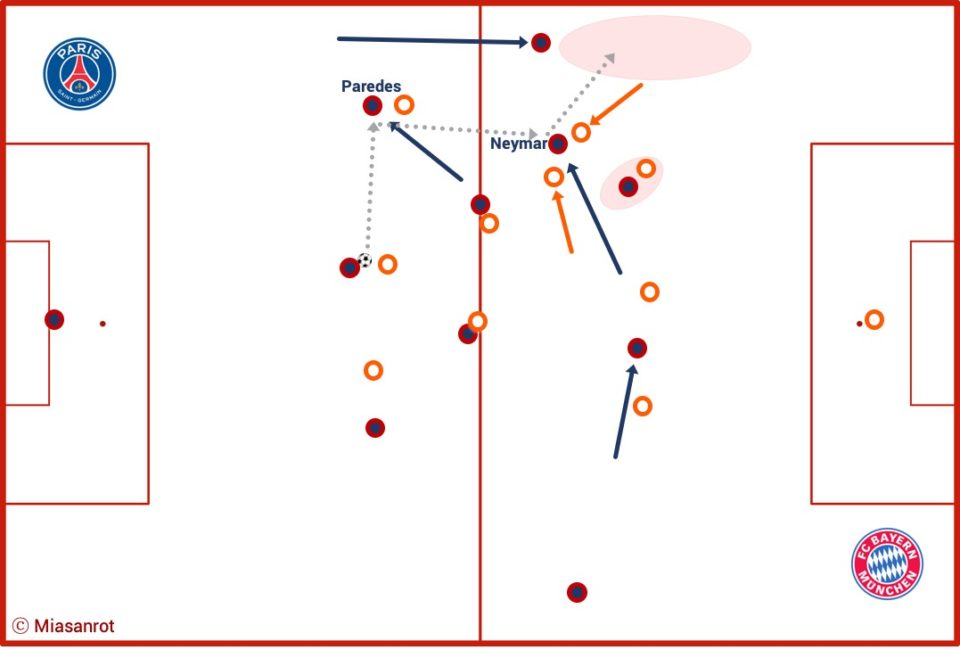
In the situation shown on the tactical board above, both the Bayern right-back and the holding midfielder are too late to prevent Neymar’s opening pass on the wing. This should not happen again against Paris. The onus will be on Bayern’s defensive players to hand over the rotating Parisians quickly and effectively among themselves.
Perhaps for this very reason Flick might give Benjamin Pavard a start, who was given his first brief time out after his injury against Lyon. Joshua Kimmich is a very offensive player at right-back, who is more likely to push up more regularly than the Frenchman. Pavard could give the defense more stability. The question then is who Flick will drop for him. This will depend on his priorities in possession of the ball. But perhaps this debate is superfluous. At the press conference on Saturday, Flick said: “I’m not convinced that he is 100 percent fit. We’ll have another fitness test today and I’ll have to think about it with my team afterwards.”
How composed in possession is PSG really?
It is of course a risky game that FC Bayern plays with their very high line. But it could be just right against PSG. For the first time this season, the French will meet a team that is capable of marking them tightly over the full distance.
From Tuchel’s point of view, it might therefore make sense to exchange the recently strong Paredes for the recovered Verratti. Verratti is able to play as clever and space-opening passes as the Argentinian, but is even stronger when he is put under pressure. His dribble skills in particular could make an important difference for PSG. Not least Houssem Aouar showed for Lyon that it is possible to outplay the Bayern press with short dribbles.
But if Bayern manage to minimize the occurrence of such situations and defend the runs of the attackers between the lines, they have a big advantage. PSG is not really versatile moving forward, but they are all the more unpredictable once the three get the ball in attack.
On Sunday, PSG can show how composed in possession they really are and whether they are sufficiently able to cope with the almost inhuman pressure Bayern is able to exert over the full distance. What Bayern are capable of doing to a team that allows them to win a lot of high balls because they take too much risk in their passing game was shown by the 8-2 victory over Barcelona. Tuchel’s team will therefore have to weigh up carefully when it is better to play the long ball forward and when courageous combinational play makes sense.
Analysis 2: build-up play FCB, Pressing PSG
The situation is similar when the tables are turned. If Bayern have the ball, Paris will also try to force them to make mistakes. The French are also a team that defends quite well overall. But they do not have the same consistency and tenacity as FC Bayern.
This could offer Bayern opportunities, but it could also be deceptive. PSG is often accused that in particular their two star players, Neymar and Mbappé, are not willing to work hard enough tracking back. However, they are not as blatant at this as Lionel Messi, for example. After all, they do what is necessary to direct their opponents’ game and put pressure on them. In doing so, they work mainly with their positioning on the pitch, less so with lots of sprints and aggressively closing down opposing players.
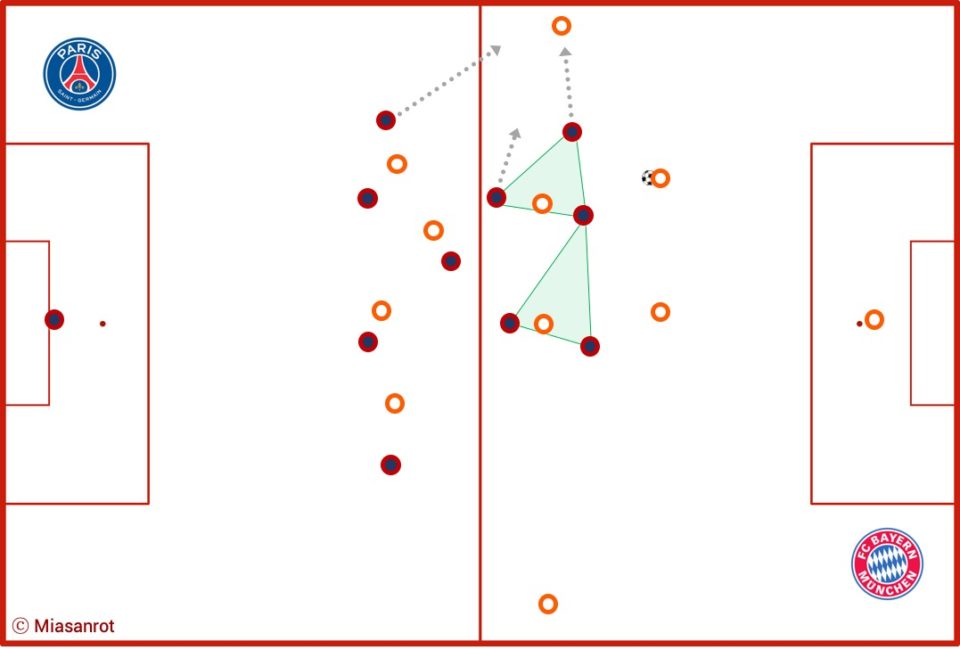
If Tuchel does not make any surprising changes to his approach on Sunday, PSG will most probably be anxious to take the engine room of the German champions out of play. For this, it will be up to PSG’s midfield to close the gaps in midfield behind Bayern’s front line and enclose Bayern’s defensive and offensive midfielders in triangles. Then, when these players receive the ball, these triangles immediately contract to force a turnover.
The conclusion for Flick, however, must not be that the players within these triangles are not included in their build-up play. Instead, they have to make PSG believe that they can win the ball and at the same time position themselves on the field in such a way that it triggers PSG’s press, but does not allow it to be successful. Thomas Müller and Serge Gnabry in particular are asked here, as they have shown great harmony in their movements so far.
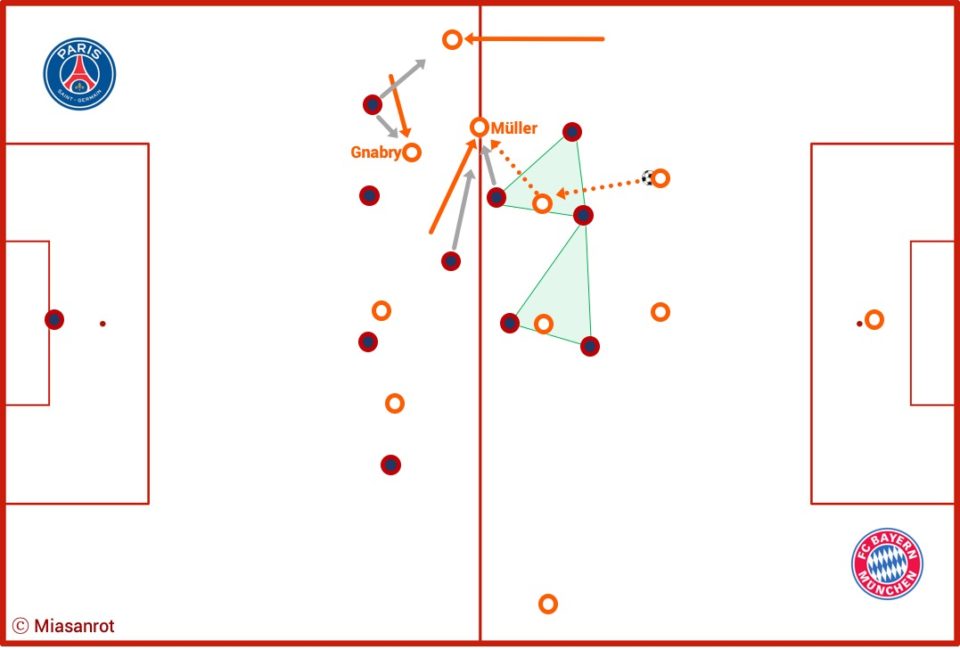
So on the one hand Bayern have to make sure that their holding midfielders can move the ball on quickly. In Thiago they also have a player who can resolve such situations with a drop of the shoulder or a short burst of speed. Against Lyon, the Spaniard launched some dangerous attacks in this way. On the other hand, he also played one or two dangerously misplaced passes in the center. Especially in this respect Bayern will not be allowed to afford PSG any breaks on Sunday.
Will Flick make changes to his starting lineup?
Nevertheless, Flick will need smooth operators like Thiago in the final to pull the 4-3-3 of Paris apart and to create valuable chances through the half-spaces as well as down the flanks. But Thiago’s defensive qualities might also come in handy. The idea of using Pavard at right-back to stabilise the game against the ball could also make sense with respect to stabilizing the game with the ball.
Leon Goretzka has been in good form lately, defended many a counter-attack against Barcelona intelligently and showed a lot of anticipation. This quality can also be very important against PSG. On the other hand, he is much more fragile in possession than Thiago or Kimmich when he is pressed and thus presents a constant risk of losing the ball.
So Flick has to make a decision in which way he wants to adapt the game of his side. Perhaps in attack? Then a double pivot with Kimmich and Thiago in the center against PSG’s high press would make a lot of sense. Or will he put a premium on not losing Goretzka’s qualities against the ball? In that case he will have to drop either Pavard or Thiago. It is improbable, however, that Flick will shift Müller out to the right wing for Ivan Perišić and also swap Gnabry’s position.
Get Davies involved
As this analysis has revealed so far, the expectation is that much of the action will take place on Bayern’s right-hand side. But by way of contrast, this oddly makes the left half especially interesting. If Bayern manage to force Paris to shift out to one side with most of their players, the other side may be open for the Roadrunner.
Thiago and Boateng are able to diagonally switch the play from one side of the pitch to the other within seconds, thanks to their passing range and accuracy. Tuchel will have to come up with something in response. With Ander Herrera, di María and Thilo Kehrer, the coach has defensive and/or fast players who can defend against Davies.
Moreover, David Alaba will have to make sure that the left-back’s advances do not leave too much open space for di María. This is another argument in favor of using Pavard. He could probably help Bayern deploy a more conservative approach at right-back than with Kimmich. By staying behind more regularly, he would also allow Boateng and Alaba to shift further right to close the gap that Davies leaves behind during his attacking runs.
Who will ascend to Europe’s throne?
Apart from these decisions, Flick will not make further changes to the game of FC Bayern. And he has every reason to do maintain a quiet hand. Every team has its strengths and weaknesses. Of course he will have to adjust the defensive organization of his team in details to match the Parisian attacking strength. But he will and should not deviate from his current strategy to follow the suggestion of Stefan Effenberg, for example, who would lower the defensive line by 20 – 25 metres. That Bayern would be depriving themselves of much of their own strengths this way was exemplary demonstrated in last season’s round of 16 knockout against Liverpool FC. Moreover, that PSG can cope with such a mid block was demonstrated against RB Leipzig.
The past months have proved Flick right and boosted the team’s self-confidence. That’s why Bayern will assume a high position on Sunday, be intent on forcing PSG to make mistakes and possibly consciously accept that they most probably will concede a few chances at the back. This is just their game and there is little point in doing something with which the players would not feel comfortable. A deeper press would deprive Flick’s Bayern of their most important quality. The thing that got them this far in the first place. No opponent in the world is worth dropping this by the wayside. Having said that, Flick nevertheless has to find the ideal blend of the two concepts: the high and aggressive press and the protection, should PSG find the gaps.
In the end, nuances will decide who gets to lift the much coveted big-eared trophy into the Lisbon night sky. There is no outright favourite. But if Bayern are able to put through their game, they may have a slight advantage this year due to their enormous quality. PSG, in the other hand, could not consistently prove that they are a deserved finalist until their 3-0 win over Leipzig. However, they seem to be in top form just in time for this clash and how Tuchel managed to unite what is surely the most difficult of dressing rooms behind this cause is remarkable. In this respect, the game is also a meeting of two teams that have achieved a great deal owing to their team spirit.
Tuchel against Flick. PSG against FC Bayern. The Champions League final will definitely go down in football history. One of the two teams will win the treble and enter the history books as the team that was able to overcome the very special circumstances of this time and ascend to the throne of Europe in 2020. For FC Bayern, it would be the ultimate punchline to what only a year ago still looked like a joke. But above all it would be an achievement that would add to Flick’s already great track record and crown his performance. He would be rightly celebrated all over the world. As uncomfortable as this is for him.



